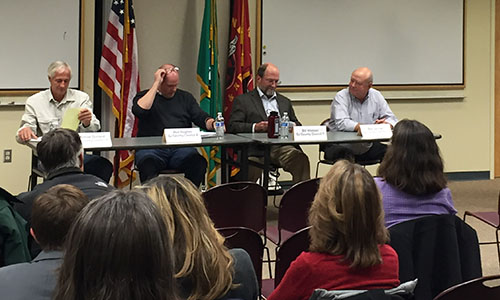— by Janet Brownell —
The San Juan Island’s League of Women Voters Orcas Island Forum was well attended on October 4th at the Orcas Island Fire Hall. Steve Bowman served as moderator, and reminded the crowd of the LWV’s mission: “The LWV is a nonpartisan political organization, that encourages the informed and active participation of citizens in government, and influences public policy through education and advocacy.”
COUNTY COUNCIL DISTRICTS 1 AND 2
All county voters will decide two of the three Council positions this election. Bill Watson and incumbent Bob Jarmen are running for District 1; Michael Durland and Rick Hughes are running for District 2. All were present at the Orcas Island LWV forum.
OPENING STATEMENTS:
Durland began. He said, “I’m a working man. I’m a doer not a talker. I’m better at listening than speaking. There are many passionate people in the islands. I will listen to you. Over the last several years, I have stood up for what I believe in.”
Durand said he wants to ensure that, with the vast number of county regulations, citizens can be confident that all of them, whether in affordable housing or tourism, etc, — all are treated fairly. “There must be consistency in solutions. More often than not, current government is reactionary rather than proactive.”
Hughes talked about his long-time connection to the island through his, and his wife’s, families. He went on to discuss the challenges of going from a 6-person to 3-person council, the change from a county administrator to a county manager, all the while still working on the SMP (Shoreline Management Program) and CAO (Critical Areas Ordinance). Hughes spoke to the positive efforts of the current county council such as “refinancing down half our debt, and reduction of solid waste tax. We have done a lot of work, but there is lots to do.” He closed by talking about “great leadership” from fellow councilpersons Jarman and Jamie Stephens.
In Watson’s opening, he spoke about working for the San Juan Island Economic Development Council and the County Charter review committee. He described his background in operational management and problem solving – managing people and problems. “I understand how organizations work and how to make them work well. I think these are key to being a successful councilperson.”
Finally, Jarman said, “I have enjoyed my position in serving all the citizens. I enjoy going to all the islands. I have literally been on every road in the county.” Jarman talked about his 13 years as a SJ Fire Commissioner, as well as his family.
WHAT IS YOUR PARTY AFFILIATION? AND HOW DO YOU WORK OTHER JOBS AS A COUNTY COMMISSIONER?
Steve Bowman, moderator for the LWV, disallowed the first question as the LWV is non-partisan and “it is irrelevant what the candidates’ party affiliation might be.”
About the work issue:
Jarman said he had a business prior to becoming a county councilperson. “After I won, I closed it. I am committed full time to the position.”
Hughes stated that while he has a business, his wife runs it and they have a bookkeeper. “This is a full time job. It’s the best job I’ve ever had.” He elaborated that time spent on work also includes not only serving needs here and the “five county range” through the Island Trust Council, but he also he spends time in Canada and Olympia, on behalf of the county.
Durland said he currently runs two businesses, but “If I’m I elected, I will tone down my businesses.”
Watson said he is retired from the tech business. “I’ve been monitoring the council and even that is a full time job. I will be committed.”
HOW WOULD YOU ADDRESS THE HIGH RATE OF TURNOVER IN COUNTY PLANNING?
Durland talked about how for the 40 years he’s been on Orcas there has been turnover in the Planning Dept. He attributes this to inconsistent interpretation of the codes, and micro-management of employees. He said that employees need more education so they understand the codes better, and that they need more autonomy.
Watson said his management background would help to lessen turnover by creating clear goals and values. After discussion with some employees, his “outsider” perspective is that the county workers feel “unsafe, disrespected, and undervalued.” He will counter that by “acknowledging their professional skills and treating them as important members of our county team.” His hope is to have “happy, motivated employees” in land use and public works.
Jarman believes the turnover is due to retirements. Overall, the council “made it a goal to provide better customer service in public works and planning.” Some changes were made to accomplish that goal. “Customer service is key and if some don’t fit in, they move on.”
Hughes agreed with Jarman that providing good customer service in Planning is critical. He also contends that “turnover has been in management. Union employees don’t have the same sense” of discontent. We’ve gone out of our way to overcome dysfunction and it seems things are getting better.” He went on to say, “We have really amazing people and we will keep improving morale.”
WHAT 2-3 THINGS ARE CRITICAL IN THE COMP PLAN REVISION?
Hughes confirmed that it is a unique opportunity to be revise the County Comprehensive Plan. Three areas he wants to work on are: the need for more affordable housing, particularly farm-worker/cluster housing; better use of rural general use land; and trails. Key to success for Hughes is the need to reach out to communities to understand their priorities.
Durland concurred with Hughes, “We need to think about each community’s needs.” He wants to talk to people and understand their vision or the future.
Watson sees the comp plan as a “vision document.” “We need a community conversation about how big do we want to grow?” He said that he would fill in the affordable housing plan in the comp plan. “We haven’t done everything that is in plan now. We need to prioritize so we can accomplish things in 20 years.” Finally, Watson questioned how to protect agricultural lands “and get farmers here so we not only maintain but grow that sector.”
Jarman said, “I’ve been here since first comp plan. We need to reach out to the communities. What do they want? How do we divide land, how do we use it? Do we set land aside for essential public services? And we need to take a look at how we use land. We all say we want rural character – without defining it.”
HOW TO ADDRESS THE AGING POPULATION
Watson talked about reading an article about Peace Health’s inability to accept hospice patients as it does not have a contract with local hospice providers. He sees that much work must be done to attract more professionals to make sure that need is met.
Jarman began by saying “I was raised to take care of seniors. We want people to age in place.” He wants to ensure that we do “not tax (the elderly) off their land.” He also pointed to a lack of convalescent services. “We need to make sure the elderly get services. It is a high priority for me.”
Durland would start by talking with people to better understand the problem; for example are there zoning issues for hospices. He would also work with public health. “This discussion must happen with the people directly involved.”
Hughes talked about how the average age in the county has gone from 37 to 58 years of age. “People move here in their mid-50s. They enjoy life. Then health problems complicate it.” Hughes talked about the possibility of a “long term care co-op.” He reiterated it is difficult to find people to work in the islands. Currently, he is addressing the issue through his work with the Opportunity Council; and he is advocating for some of the county Mental Health (1/10th of one percent of retail sales) tax money to go towards a case worker at Orcas Community Resource Center.
ENVIRONMENT vs. PROPERTY RIGHTS. FRIENDS OF SAN JUANS vs. COMMON SENSE DO YOU BELONG TO EITHER ORGANIZATION? WHICH ONE?
Again, Steve Bowman said there is no “relevance as to what organization a candidate has/does belong.” At this point an audience member asked “can we take a vote on that?” The answer: No.
Watson does not see this as an issue of the environment vs. property rights: “I see this as a conflict between property rights and property rights.” The Shoreline Master Plan tasks the government with protecting the commons. According to Watson, those property rights can come in conflict with private property rights. “If we treat it this way – the emotionalism goes away. It is no different than you and your neighbor trying to resolve a property issue.”
For Hughes it is “all about balance. When I came into office I thought we were being torn apart by CAO (Critical Areas Ordinance). We came together. As a council – I think we have found a balance between regulations and property rights.” He said that there were things he didn’t like in the CAO, but he voted for it, as he did for the Shoreline Master Plan (SMP).
“Governance isn’t about winning — it’s about moving forward. I hope we can come to a compromise to work together to protect this beautiful environment while allowing people to do what that want on their property.”
Jarman echoed Hughes, “I share many of the same views as Hughes. We didn’t always agree — but we came to consensus. They (the CAO and SMP) are good documents, and I’m looking forward to being re-elected to work on tweaking them and the comp plan.”
Durland stated that both “Friends and CSA are needed. We need to protect environment, but also allow people to build their house without ruining it.”
CLOSING STATEMENTS
Hughes re-iterated, “I’ve really had a great time in the last years; it’s the best job I’ve ever had. We have become strong players in Olympia and with (U.S. Representative) Larsen’s office.” He also talked about specifics. “After the decline in 2008, it felt that the infra-structure needed improvement on Orcas. We are working on it. There’s going to be an exciting new ferry area. But we also need new economic development. Tourism is great, but expensive. We are moving to become a high tech community. Telecommuting jobs will join tourism as the new economy.”
Durland closed saying, “I want to give back to my community. I hear from people that they want want a council working for them. We need more year-round jobs. Jobs augmented by tourism, but not just tourism jobs.”
Jarmen said, “I enjoy what I’m doing. I’ve spent the last 40 years working to better this community. I’ve only been affiliated with civic activities to better where we live. I’ve always worked to maintain the lifestyle we enjoy.”
Watson said, “Instead of looking back, I will look forward. Instead of being reactive, I will be proactive in addressing our problems. Instead of wasting limited resources on incomplete or unlawful ordinances, I will spend them on our priority tasks.” He ended with, “I believe we must always strive to do better.”
**If you are reading theOrcasonian for free, thank your fellow islanders. If you would like to support theOrcasonian CLICK HERE to set your modestly-priced, voluntary subscription. Otherwise, no worries; we’re happy to share with you.**








